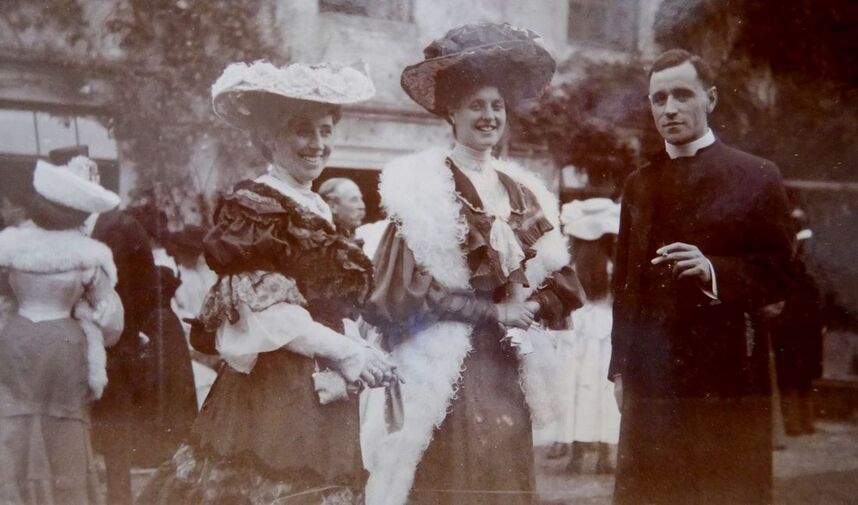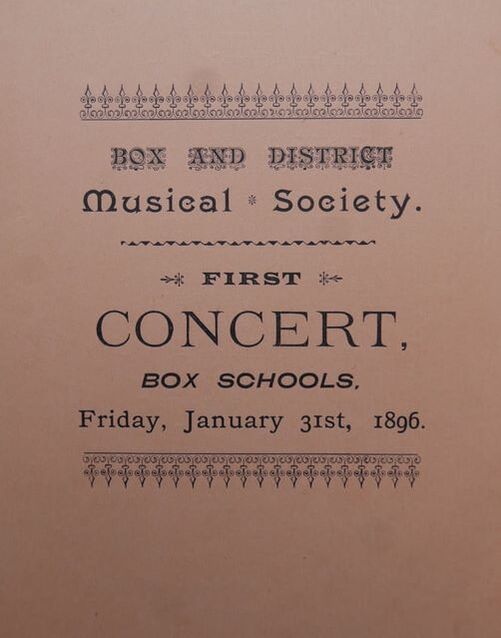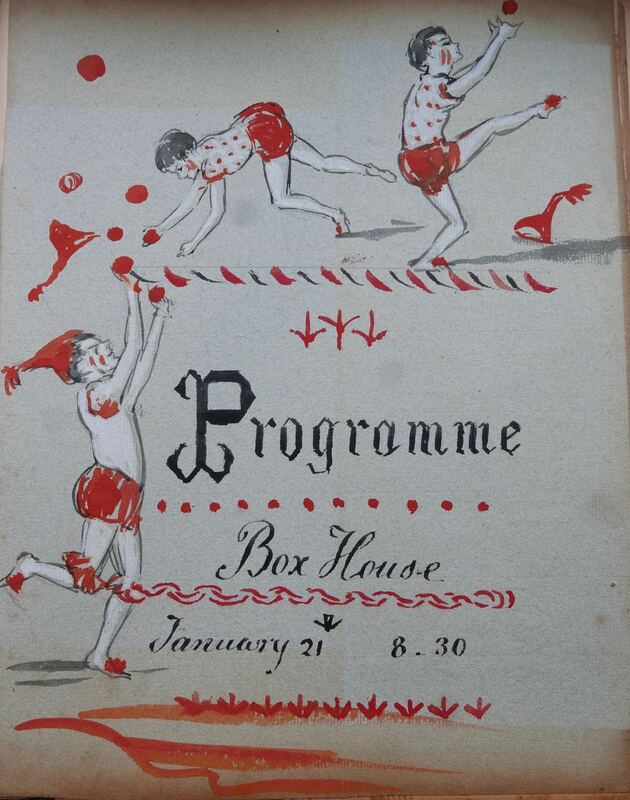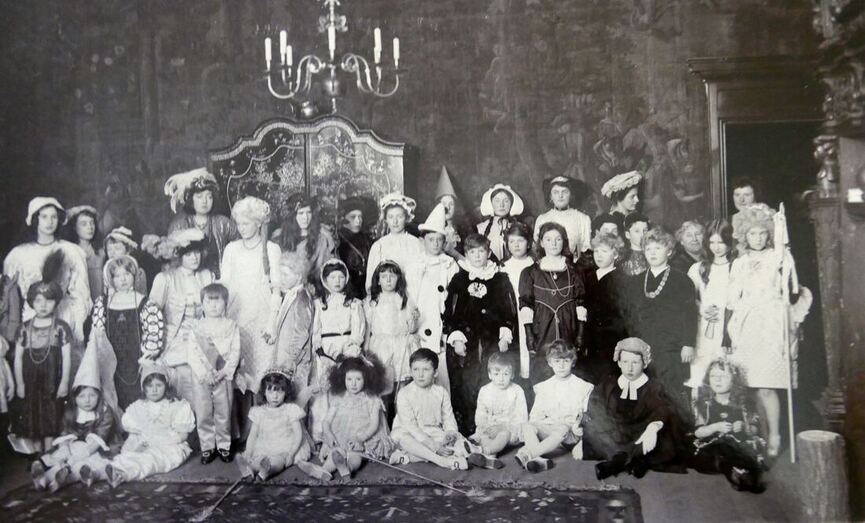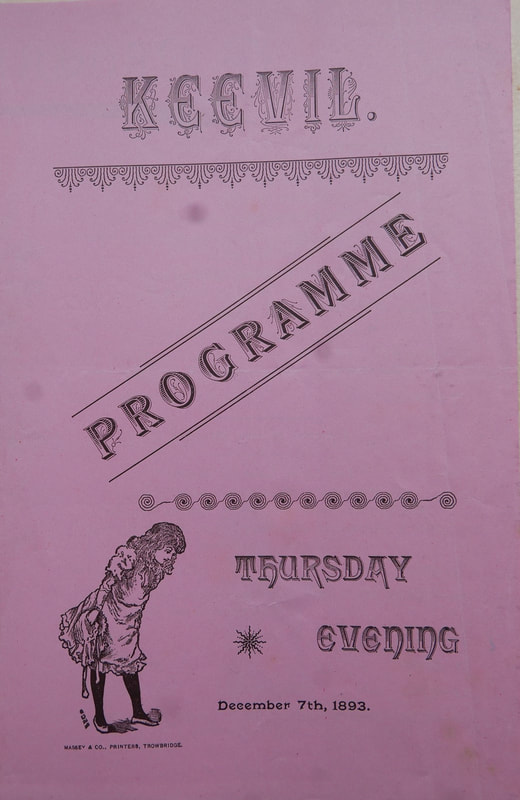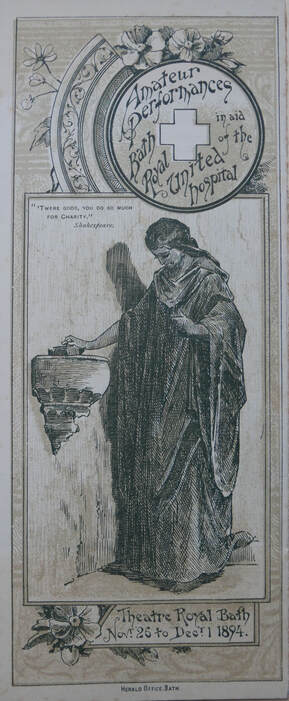Constance Fanny (1864 - 1932): Theatrical Daughter
Alan Payne Family photos and research Diana Northey March 2020
Alan Payne Family photos and research Diana Northey March 2020
Jane Austen's novel Mansfield Park is a love story about the emerging relationship between Fanny Price and her cousin Edmund Bertram, who is in training to be a clergyman. We don't know if Constance Fanny Northey (known as Fanny), eldest daughter of George Wilbraham Northey, ever read the novel but her life bore some striking similarities to the characters in the book, including her marriage to a clergyman, Walter Charles Barlow.
Walter Charles Barlow (1868 - 1933)
Walter was four years younger than Fanny, a local person from Bathampton.[1] Their relationship was through family friendship and their mutual love of amateur dramatics. Fanny's personal scrapbook gives an interesting insight into her thinking. The pages are neatly ordered starting with notices of family marriages and engagements. She lists the marriages of her siblings, then her own, followed by the letters from tenants and cottagers on her father's estate enclosing wedding presents. This was the world in which she lived.
Walter's father was Mr Henry Barlow and Walter was born at St Leonard's-on -Sea, East Sussex in 1867. He was related to Oldham Thomas Barlow, postmaster of Bath from 1863 until 1890.[2] Walter studied at Pembroke College, Oxford where he gained a Master of Arts and later at Litchfield Theological College.[3] The Barlows were family friends of the Northeys and in 1891 Walter was a visitor at Ashley Grove, the guest of George and Alice Mitton (nee Northey).
Walter clearly had cultural interests including amateur dramatics and music, conducting a Sacred Cantata in 1910 and founder and director of the Box and District Musical Society in 1896.[4]
Walter Charles Barlow (1868 - 1933)
Walter was four years younger than Fanny, a local person from Bathampton.[1] Their relationship was through family friendship and their mutual love of amateur dramatics. Fanny's personal scrapbook gives an interesting insight into her thinking. The pages are neatly ordered starting with notices of family marriages and engagements. She lists the marriages of her siblings, then her own, followed by the letters from tenants and cottagers on her father's estate enclosing wedding presents. This was the world in which she lived.
Walter's father was Mr Henry Barlow and Walter was born at St Leonard's-on -Sea, East Sussex in 1867. He was related to Oldham Thomas Barlow, postmaster of Bath from 1863 until 1890.[2] Walter studied at Pembroke College, Oxford where he gained a Master of Arts and later at Litchfield Theological College.[3] The Barlows were family friends of the Northeys and in 1891 Walter was a visitor at Ashley Grove, the guest of George and Alice Mitton (nee Northey).
Walter clearly had cultural interests including amateur dramatics and music, conducting a Sacred Cantata in 1910 and founder and director of the Box and District Musical Society in 1896.[4]
Above left: the first concert of the Box Musical Society organised by Walter and Right: an early play programme
Early Plays
Fanny kept a scrapbook of plays in which she and Walter performed. In the years before cinema, radio and television, local plays were one of the few entertainments available in the evening. The Northey family, particularly the unmarried women, had time to rehearse and money to fund costumes and production costs.
The first play recorded by Fanny was at Chippenham Town Hall of Dearest Mamma a comedietta in one-act, in which Walter played the lead character. On the bill were other local notables: Lilian Hobhouse, Evelyn Awdry and Dorothy Clutterbuck. This play didn't include Fanny but in February 1884 she appeared as a maid in a three act play Everybody's Friend at 8 Cavendish Crescent, Bath, together with her elder brother George Northey and his fiancée Mabel Hunter. We get an idea of the comedy from a few lines: What a confounded blunder I have committed. I have given him the wrong letter! Fanny was the maid who could postulate on people's relationship with poodles with lines like I wish there was a law against a woman kissing any brute, except one on two legs.
In January 1890 Fanny and Walter appeared together in a farce My Lord in Livery at Mrs Bromley's At Home put on at Bath College, performing for 250 of the elite of Bath, notwithstanding the influenza scare.[5] Walter played the part of Spiggott, the old family butler, and Fanny, a minor part as friend of the leading woman. Other members of the Northey family joined in the performance and younger brother Cyril Northey was a page boy. When the play was performed at the New Schools in April 1891 fundraising for the Box Conservative Club, the actors were joined by Misses Mary and Mabel Northey. It was a Northey family affair, George Wilbraham took the chair, introducing songs performed by locals and concluding events by inviting the audience to join in a dance. The papers recorded it as a complete success.
Fanny kept a scrapbook of plays in which she and Walter performed. In the years before cinema, radio and television, local plays were one of the few entertainments available in the evening. The Northey family, particularly the unmarried women, had time to rehearse and money to fund costumes and production costs.
The first play recorded by Fanny was at Chippenham Town Hall of Dearest Mamma a comedietta in one-act, in which Walter played the lead character. On the bill were other local notables: Lilian Hobhouse, Evelyn Awdry and Dorothy Clutterbuck. This play didn't include Fanny but in February 1884 she appeared as a maid in a three act play Everybody's Friend at 8 Cavendish Crescent, Bath, together with her elder brother George Northey and his fiancée Mabel Hunter. We get an idea of the comedy from a few lines: What a confounded blunder I have committed. I have given him the wrong letter! Fanny was the maid who could postulate on people's relationship with poodles with lines like I wish there was a law against a woman kissing any brute, except one on two legs.
In January 1890 Fanny and Walter appeared together in a farce My Lord in Livery at Mrs Bromley's At Home put on at Bath College, performing for 250 of the elite of Bath, notwithstanding the influenza scare.[5] Walter played the part of Spiggott, the old family butler, and Fanny, a minor part as friend of the leading woman. Other members of the Northey family joined in the performance and younger brother Cyril Northey was a page boy. When the play was performed at the New Schools in April 1891 fundraising for the Box Conservative Club, the actors were joined by Misses Mary and Mabel Northey. It was a Northey family affair, George Wilbraham took the chair, introducing songs performed by locals and concluding events by inviting the audience to join in a dance. The papers recorded it as a complete success.
|
Other members of the Northey family appeared in plays from time to time. Percy had a number of roles but his acting appears to have been unworthy of mention although he was most correct in his make-up and manner. George Edward's wife, Mabel, appeared both before and after her marriage.
Engagement and Marriage Perhaps Fanny and Walter's relationship was cemented when they acted the main parts of Beauty and Beast in The Assembly Rooms Bath. The performance was enhanced by the children under Mrs Rolfe's care who performed the dance of the gnomes and also another by peasants. Fanny and Walter were married at St Thomas à Becket Church on 5 January 1892.[6] Fanny's younger sister, Alice, had married 7 years before and there may have been some pressure on Fanny as there was no widespread notification of their engagement. Suitable dramatic settings were made: Between (Ashley) Manor House and the Church several arches were erected.[7] The tenants, cottagers and employees of the estate and family friends were most generous in the gifts made to the couple, which ran to two full columns in the local press. |
For a while Fanny continued in the theatre. In 1893 she performed in a series of Old English Country Dances at the Marlborough Corn Exchange fund-raising for the Wiltshire Regiment whilst Walter performed various songs in the Black and White Minstrel Show, playing the roles of Bones and Tambo. The show was reprised at Keevil and Melksham in December 1893 for the Primrose League, which supported the Conservative Party in remembrance of Prime Minister Disraeli's death two years earlier.
|
Later Theatre Performances
Gradually Fanny ceased to appear in plays whilst Walter continued with repeat performances of My Lord in Livery, now playing the lead, and various comic songs and routines including Trial by Jury and HMS Pinafore by Gilbert and Sullivan in the Assembly Rooms, Bath. He regularly toured Wiltshire: Corsham, Bradford, Chippenham, Hungerford and Westbury. However, Fanny did make occasional performances in new plays such as Ici on Parle Francais, Withered Leaves at Monkton Farleigh, and Sweethearts in Bristol. One of her last performances was as Lady Betty in Dorothy, a comic opera, performed for the Royal United Hospitals and directed by Walter in 1895. The play was celebrated because Walter arranged for a pack of fox hounds to be led on stage for a hunting scene.[8] Fanny diligently recorded every programme and newspaper review of Walter's performances. Many extracts are included loose-leaf without being stuck in and it could be that Fanny was struggling to keep up with all of Walter's performances in The Pantomime Rehearsal, Bob Shocker and A Summer Holiday. None of the other Northey family members is recorded after 1894 and Fanny was presumably at home expecting her first child by 1896. Most of the plays were put on for charity causes. Some were for the Royal United Hospitals, and performances lasted over a week in November 1894. This was followed in December by two plays, Withered Leaves and Obliging a Friend on behalf of the Chapel Plaister Restoration Fund at the New Schools, Box. It was full of family performances by Walter and Fanny, Mabel Northey, Mrs Mitton (Alice Northey) and Mary Louisa Northey, who acted with her arm in a sling as a result of a carriage accident. The programme was repeated some years later at the New Schools in August 1892, except for the pregnant Fanny. Right: Charity performance in 1894, programme illustration |
Later Life
Walter gained his Bachelor of Arts in 1892, the same year as their marriage, and was ordained in 1901. He was appointed curate of St Mary Magdalen, Bridgnorth in 1906 and the family took residence there.[9] In the years 1922-30 Walter was appointed vicar of Staunton-on-Wye, Herefordshire. They moved to Ferndale, Corsham, in 1930 after Walter had suffered a nervous breakdown.[10] Fanny had an operation at Melksham Hospital and died there in 1932. Walter died in Bath on 19 June 1938.
Fanny and Walter had two sons, Walter Northey Cecil Barlow (b 22 February 1897) and Henry Arthur Northey Barlow (b 1905). Walter junior was a Captain in the Indian Army and won the Military Cross for service in Mesopotamia in the First World War.[11] In 1939 he was described as Proprietor of the Severn Petroleum Independent Operators and Distributors. Henry was in the Indian Civil Service.
We don't know much about Fanny and Walter's married life during their time at Bridgnorth. In that respect it was the same as Fanny Price's marriage to Edmund Bertram, which was left in suspense by Jane Austen.
Walter gained his Bachelor of Arts in 1892, the same year as their marriage, and was ordained in 1901. He was appointed curate of St Mary Magdalen, Bridgnorth in 1906 and the family took residence there.[9] In the years 1922-30 Walter was appointed vicar of Staunton-on-Wye, Herefordshire. They moved to Ferndale, Corsham, in 1930 after Walter had suffered a nervous breakdown.[10] Fanny had an operation at Melksham Hospital and died there in 1932. Walter died in Bath on 19 June 1938.
Fanny and Walter had two sons, Walter Northey Cecil Barlow (b 22 February 1897) and Henry Arthur Northey Barlow (b 1905). Walter junior was a Captain in the Indian Army and won the Military Cross for service in Mesopotamia in the First World War.[11] In 1939 he was described as Proprietor of the Severn Petroleum Independent Operators and Distributors. Henry was in the Indian Civil Service.
We don't know much about Fanny and Walter's married life during their time at Bridgnorth. In that respect it was the same as Fanny Price's marriage to Edmund Bertram, which was left in suspense by Jane Austen.
References
[1] The Bath Chronicle, 1 September 1917
[2] Private Northey papers
[3] The Worcestershire Chronicle, 28 December 1901
[4] Bridgnorth Journal and South Shropshire Advertiser, 20 April 1910
[5] Private Northey papers
[6] Clifton Society, 7 January 1892
[7] The Bath Chronicle, 7 January 1892
[8] Private Northey papers
[9] Sheffield Daily Telegraph, 12 April 1906 and The Globe, 23 June 1892
[10] The Wiltshire Times, 19 November 1932
[11] The Bath Chronicle, 1 September 1917
[1] The Bath Chronicle, 1 September 1917
[2] Private Northey papers
[3] The Worcestershire Chronicle, 28 December 1901
[4] Bridgnorth Journal and South Shropshire Advertiser, 20 April 1910
[5] Private Northey papers
[6] Clifton Society, 7 January 1892
[7] The Bath Chronicle, 7 January 1892
[8] Private Northey papers
[9] Sheffield Daily Telegraph, 12 April 1906 and The Globe, 23 June 1892
[10] The Wiltshire Times, 19 November 1932
[11] The Bath Chronicle, 1 September 1917
